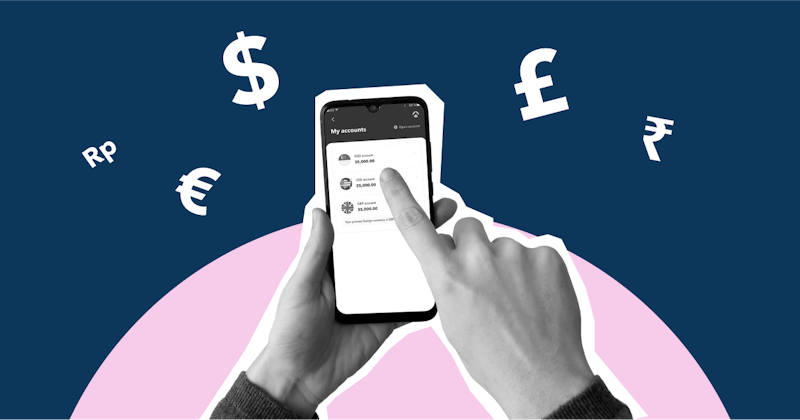Need to send, receive, or hold money in different currencies without paying high fees? This guide shows you exactly how multi-currency accounts work, why they matter, and how to open one in Hong Kong. Save more, manage better, and take control of your international transactions.
What Is a Multi-Currency Account?
A multi-currency account lets you hold, receive, and send money in different currencies—within one single account.
You don’t need separate accounts for each currency. The same account number, SWIFT code, and beneficiary name apply across all supported currencies.
In Hong Kong, most banks and fintech companies offer multi-currency accounts to both businesses and individuals.
These accounts usually support major global currencies like:
- HKD (Hong Kong Dollar)
- USD (US Dollar)
- EUR (Euro)
- GBP (British Pound)
- SGD (Singapore Dollar)
- JPY (Japanese Yen)
- AUD (Australian Dollar)
- CNY (Chinese Yuan)
This type of account is sometimes also called a foreign currency account or global account, depending on the provider.
It’s commonly offered by traditional banks like HSBC and Citibank, and fintech providers like Wise, Revolut, Airwallex, and Statrys.
Multi-currency accounts are designed for people or companies dealing with international money—so they don’t get hit with high conversion fees or delays.
Because all currencies live in the same account structure, it's also simpler for accounting and reconciliation.
If you’re working across borders or receiving payments from other countries, this type of account is a must.
How Does a Multi-Currency Account Work?
A multi-currency account works almost like a standard bank account.
You can receive payments in multiple currencies, hold those currencies in your account, and choose when to convert them based on the exchange rate.
Most providers give you access to a dashboard or app where you can:
- See balances by currency
- Monitor exchange rates in real-time
- Manage transfers and conversions
You can send, receive, and hold money in supported currencies like USD, EUR, GBP, and others—without automatic conversion.
If you're converting money, you can usually make a spot trade—that means locking in the exchange rate you see at that exact moment.
The actual settlement of that trade often happens in T+2, which means two business days later. But your rate is locked instantly.
This gives you control over timing, instead of letting a bank auto-convert it behind the scenes at a poor rate.
You can access your funds through:
- Wire transfers
- Local transfers (depending on provider)
- Debit cards (some fintechs offer this)
- Online banking and mobile apps
Some accounts also support:
- Cheque payments (mainly with banks)
- Overdraft facilities
- Linked savings or time deposit options
Fees vary by provider. Some charge:
- Monthly maintenance fees
- Currency-specific transaction fees
- Conversion fees or margins
- Charges for deposits or withdrawals outside set thresholds
Fees are often lower or waived if both parties use the same platform or bank.
Functionally, everything is streamlined. You can operate in multiple currencies without switching platforms or juggling multiple accounts.
It’s especially useful when working with overseas clients or vendors, as you’re able to transact in their preferred currency without delay or forced conversion.
What Are the Benefits of a Multi-Currency Account?
Here are the key benefits you can expect:
| Benefit | What It Means |
|---|---|
| Save on Foreign Exchange Fees | Avoid automatic conversions and high FX margins. Convert only when rates favor you. |
| Get Paid Like a Local | Receive payments in your client’s local currency with local account details. |
| Simplify Global Transactions | Send and receive multiple currencies from one platform—no need for multiple accounts. |
| Improve the Customer Experience | Provide familiar, local payment methods that are easy to use and reliable. |
| Make Cross-Border Business Easier | No need to open bank accounts in other countries. Operate globally from one account. |
| Manage Your Finances in One Place | See all your currency balances and transactions in one dashboard. |
| Flexible Currency Conversion | Convert funds when it makes financial sense. Lock in better exchange rates. |
Who Should Open a Multi-Currency Account?
Not everyone needs one, but a multi-currency account is particularly benefits people and businesses dealing with money across borders.
Here’s who can benefit the most:
1. Expatriates
If you live abroad but still earn, spend, or send money in your home currency, a multi-currency account helps you avoid constant conversions.
You can hold and manage funds in multiple currencies and transfer money between countries with less hassle and lower fees.
2. Frequent Travellers
If you travel often for work or personal reasons, this account lets you spend like a local without using money changers or paying FX fees every time.
It also makes it easier to manage budgets across currencies and avoid unexpected rate changes during travel.
3. International Businesses
If your business operates across borders or works with overseas clients, a multi-currency account is a must.
You can invoice, receive, and pay in multiple currencies without forced conversion—saving money on exchange rates and fees.
If you're planning to set up a company in Hong Kong, a multi-currency account will help you manage cross-border transactions from day one.
4. Freelancers and Remote Teams
Freelancers or businesses paying contractors in different countries benefit by holding funds in their contractors' local currencies.
This avoids payment delays and lets you pay faster without extra FX charges from platforms or banks.
5. E-Commerce Sellers
If you sell products on global marketplaces like Amazon, Etsy, or Shopify, getting paid in the customer’s currency improves your profit margin.
Multi-currency accounts are especially useful for eCommerce businesses in Hong Kong that sell to customers in multiple countries.
You can hold the earnings in that currency and convert when rates are favorable.
6. Businesses Dealing with CNY, HKD, or Multiple Global Currencies
If you're working regularly with HKD, CNY, USD, EUR, or similar major currencies, using a multi-currency business account in Hong Kong gives you smoother, faster access to those funds.
You can also open a business account online in Hong Kong and enable multi-currency features through fintech providers or traditional banks.
It’s especially helpful for cross-border trade in Asia.
Pros and Cons of Multi-Currency Accounts
Multi-currency accounts come with clear advantages, especially for international businesses and anyone managing funds in multiple currencies.
But like any financial tool, there are trade-offs. Here’s a full comparison:
| Pros | Cons |
|---|---|
| Save on FX fees by converting when rates are in your favor. | Some banks or fintech providers charge ongoing account fees. |
| Send and receive payments in multiple currencies from one account. | Some currencies still come with spreads or service charges. |
| Control when to convert and manage exposure to rate changes. | Balances may fluctuate based on market rates. |
| One dashboard to manage and track all currencies in real-time. | These accounts are for holding and transacting, not growing funds. |
| Especially helpful for companies trading across borders. | Opening a business account may require company documents and KYC checks. |
Set up a company in Hong Kong to make the most of multi-currency banking.
How to Open a Multi-Currency Account (Step-by-Step)

Opening a multi-currency account in Hong Kong is a simple process, but requirements may vary depending on whether you're using a traditional bank or a fintech provider.
Here’s how to get started:
Step 1: Choose Your Account Provider
Select a provider that fits your needs—this could be a traditional bank like HSBC or DBS, or a fintech platform like Statrys.
Compare fees, features, supported currencies, and user experience before deciding.
If you're new to banking in Hong Kong, this guide on choosing the best business accounts in Hong Kong is a great starting point.
Step 2: Prepare the Required Documents
You’ll typically need:
- Passport or HKID
- Proof of address
- Visa or employment documents (if applicable)
- Company registration documents (for business accounts)
Step 3: Submit Your Application
You can apply online, in-person at a bank, or through a service provider.
Some traditional banks require a physical visit for identity verification, especially for business accounts.
Fintech platforms usually allow a fully remote process.
Step 4: Complete Verification
This step includes identity checks, document validation, and possibly a short interview.
Digital banks and neobanks usually complete this within a few working days.
Step 5: Activate and Start Using Your Account
Once approved, your account goes live.
You can now hold, receive, and convert multiple currencies—all under one account.
Want to avoid long branch queues? Here's how to open a corporate bank account online in Hong Kong with ease.
Choosing the Best Multi-Currency Account Provider in Hong Kong
Not all multi-currency account providers are the same. Your choice will affect how much you pay in fees, how fast you can transact, and how easy it is to manage different currencies.
Here’s how to choose the right one:
Compare Banks vs. Fintech Providers
Traditional banks like HSBC and Citibank are trusted but often charge higher fees and require in-person onboarding.
Fintech companies like Wise, Revolut, and Statrys usually offer lower fees, better exchange rates, and faster setup.
Some banks now partner with fintechs to offer more flexible multi-currency solutions under one platform.
Key Factors to Consider
| Factor | What to Look For |
|---|---|
| Supported Currencies | Choose a provider that supports the currencies you transact in regularly. |
| Fees | Watch for monthly fees, FX margins, inactivity charges, and withdrawal limits. |
| Exchange Rates | Fintech platforms often offer real-time, mid-market rates with low spreads. |
| User Experience | Prioritize clean dashboards, mobile access, and easy currency management. |
| Customer Support | Ensure you have access to quick help, especially for high-volume or urgent transfers. |
Some providers also charge for receiving specific currencies or setting low-balance thresholds. Always read the fine print and compare options side by side.
Need help choosing the right business-friendly platform? Check out our review of the top banks in Hong Kong to see how they stack up.
Regulatory Considerations in Hong Kong
Hong Kong has a strong financial regulatory system that protects users and ensures trust.
HKMA Regulations
Traditional banks offering multi-currency accounts are regulated by the Hong Kong Monetary Authority (HKMA). The HKMA oversees banking operations, licensing, and compliance with financial standards.
If you're using a bank, it's almost always HKMA-regulated.
SVF (Stored Value Facility) Licenses
Many fintech companies and non-bank providers operate under SVF licenses. These are issued by the Customs and Excise Department (C&ED) and allow companies to hold and move client funds.
Examples of SVF license holders include Statrys, Wise, and Airwallex.
You can search for licensed SVF providers on the C&ED website to confirm if a company is legitimate.
Why Regulation Matters
Using a regulated provider gives you added protection. It means the company follows anti-money laundering (AML), data security, and customer protection rules.
Always check if your provider is:
- HKMA-licensed (for banks), or
- SVF-licensed (for fintech platforms)
Final Thoughts
A multi-currency account is a practical tool for anyone doing business across borders.
Whether you're managing international payments, reducing currency conversion fees, or simplifying your financial setup, choosing the right provider can make all the difference.
At Air Corporate, we help entrepreneurs, startups, and SMEs open the right business account in Hong Kong—quickly, compliantly, and 100% online.
If you're ready to expand globally with the right financial tools, get started with Air Corporate today!
FAQs
You can avoid foreign exchange fees, receive payments in different currencies, and convert funds when rates are favorable. It also simplifies global transactions and helps you manage international finances in one place.
It depends on your needs. For traditional banks: HSBC and Citibank offer strong options. For fintech: Wise, Statrys, and Airwallex offer competitive fees and faster setup.
Yes, most multi-currency accounts function like current accounts. They allow day-to-day transactions like transfers, payments, and currency conversion. Some may also come with cards and online banking features.






